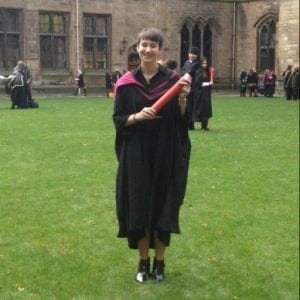 This week’s ‘Women in Law Wednesday’ is Dr. Karla Perez Portilla, who has been a lecturer here at GCU Law since October 2018. We were keen to talk to her not only because of how her career relates to law, but because of how her legal work intersects with social justice. In fact, we approached her for the project after she delivered an extremely interesting lecture on ‘Feminism and Jurisprudence’ to LLB3 last semester. Karla has given some brilliant and insightful answers about her career progression and what it means to be a woman in law.
This week’s ‘Women in Law Wednesday’ is Dr. Karla Perez Portilla, who has been a lecturer here at GCU Law since October 2018. We were keen to talk to her not only because of how her career relates to law, but because of how her legal work intersects with social justice. In fact, we approached her for the project after she delivered an extremely interesting lecture on ‘Feminism and Jurisprudence’ to LLB3 last semester. Karla has given some brilliant and insightful answers about her career progression and what it means to be a woman in law.
Karla explains that her ‘career started in Mexico researching and teaching Constitutional Law, Human Rights and Anti-Discrimination Law at the National Autonomous University of Mexico’. She has also ‘been a guest lecturer at the University of Strathclyde and Teaching Fellow at University College London, Faculty of Law’ which is where she completed her PhD. When asked about her career journey, Karla explained once she had graduated it was not easy to find a job in the UK. On top of this, she was also a new mum. She ‘therefore started volunteering, and little by little, I built my reputation in Glasgow, combining my academic experience with ‘hands-on’ work for the third sector’. Her work in the third sector consisted of prejudice reduction programmes, delivering training and implementing and evaluating interventions. She was a community practitioner which, she explains, ‘was a role that has enriched and informed my teaching methods and approaches’. She has brought this experience she speaks of into her role at GCU Law.
We asked Karla what she believes her greatest achievements were in her career journey so far. She explains that as she likes thinking and developing ideas and theories with practical application that a highlight in her career has been to have published two different single author books with renowned publishing house – one in English and one in Spanish. She explains, ‘it is unusual to publish a book based on an LLB dissertation in Mexico and having published a revised version of my PhD thesis with Routledge, is equally joyful.’ Further to this Karla explains that the revised version allowed her to ‘expand the linguistic extent of her contributions to legal knowledge’ and demonstrate her ‘commitment to social justice and academic rigour’.
There are various reasons, Karla says, for why these publications were a highlight in her career but she notes two specific reasons. Firstly, ‘the crave for and the difficulties in achieving recognition as a woman of colour’ and secondly because it has given her the opportunity to use her books ‘in academic settings and within the wider community in international and local conferences, specialised courses, training programmes, academic modules and diplomas both in Mexico and in the UK.’
In response to a question about gender balance in the LLB, Karla explains that there is not much difference between the students at GCU Law and the students where she completed her degree in Mexico, ‘there are still many women at the beginning of a law degree and very few making it to the top, in virtually all sectors.’ An interesting insight into the universality of the issue.
We next wanted to ask Karla about whether she has ever felt disadvantaged as a woman in law, ‘as a woman generally and as a woman from an ethnic minority background in the UK, I have always felt that I have to work harder, stay longer, excel, etc… I have felt this pressure both in Mexico and in the UK.’ On the other hand, she feels that ‘being a woman from an ethnic minority background with experience of migration has helped me make meaningful contributions to academia and in practice. Lived experience coupled with rigorous research and practical work allows us to provide valuable insights in order to bring about positive exchange.’ She finishes her answer with an interesting insight; ‘I think it is fair to say that, to a large extent, lived experience is a basic ingredient for bringing about social justice.’
Finally, as we ask all our interviewees, we asked Karla what being a woman in law meant to her:
‘It means the need to recognise that being a woman is a range of experiences shaped by skin colour, ethnic origin, nationality, sexual orientation, gender identity, socio-economic background, religion, etc.
For me, being a woman in law means a desire and the possibility to make the understanding and use of such terms, one that actually includes the diversity, roles and identities of women. I believe that we have to make a conscious effort to identify, seek to portray and celebrate the experiences of those overlooked or marginalised. It would be useful to make the most of the concept of intersectionality, as coined by Kimberle Crenshaw, in order to include and make visible a range of real lived experiences, histories, challenges and achievements.’
We thank Karla for her valuable contribution to the project. We hope that her inspired words have provoked thought about how the law can be used for social justice.
By Lucy Mackay LLB3




